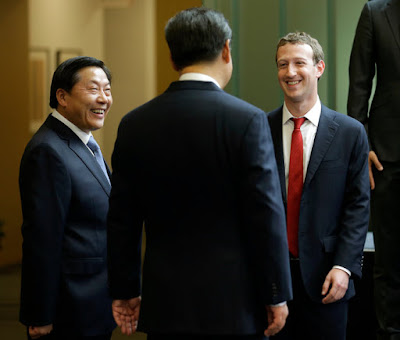Facebook Said to Create Censorship Tool to Get Back Into China
Mark Zuckerberg, Facebook’s chief executive, has cultivated relationships with China’s leaders, including President Xi Jinping. He has paid multiple visits to the country to meet its top internet executives. He has made an effort to learn Mandarin.
Inside Facebook, the work to enter China runs far deeper.
The social network has quietly developed software to suppress posts from appearing in people’s news feeds in specific geographic areas, according to three current and former Facebook employees, who asked for anonymity because the tool is confidential. The feature was created to help Facebook get into China, a market where the social network has been blocked, these people said. Mr. Zuckerberg has supported and defended the effort, the people added.
Facebook has restricted content in other countries before, such as Pakistan, Russia and Turkey, in keeping with the typical practice of American internet companies that generally comply with government requests to block certain content after it is posted. Facebook blocked roughly 55,000 pieces of content in about 20 countries between July 2015 and December 2015, for example. But the new feature takes that a step further by preventing content from appearing in feeds in China in the first place.
Facebook does not intend to suppress the posts itself. Instead, it would offer the software to enable a third party — in this case, most likely a partner Chinese company — to monitor popular stories and topics that bubble up as users share them across the social network, the people said. Facebook’s partner would then have full control to decide whether those posts should show up in users’ feeds.
The current and former Facebook employees caution that the software is one of many ideas the company has discussed with respect to entering China and, like many experiments inside Facebook, it may never see the light of day. The feature, whose code is visible to engineers inside the company, has so far gone unused, and there is no indication that Facebook has offered it to the authorities in China.
But the project illustrates the extent to which Facebook may be willing to compromise one of its core mission statements, “to make the world more open and connected,” to gain access to a market of 1.4 billion Chinese people. Even as Facebook faces pressure to continue growing — Mr. Zuckerberg has often asked where the company’s next billion users will come from — China has been cordoned off to the social network since 2009 because of the government’s strict rules around censorship of user content.
The suppression software has been contentious within Facebook, which is separately grappling with what should or should not be shown to its users after the American presidential election’s unexpected outcome spurred questions over fake news on the social network. Several employees who were working on the project have left Facebook after expressing misgivings about it, according to the current and former employees.
A Facebook spokeswoman said in a statement, “We have long said that we are interested in China, and are spending time understanding and learning more about the country.” She added that the company had made no decisions on its approach into China.
Facebook’s tricky position underscores the difficulties that many American internet companies have had gaining access to China. For years, companies like Google and Twitter have been blocked there for refusing to yield to the government’s demands around censorship. In 2010, Google said it was directing users of its search engine in China to its service in Hong Kong, because of censorship and intrusion from hackers. Other companies, like the professional social networking service LinkedIn, agreed to censor some content on their platforms in China.
The current climate for internet companies in China may not help Facebook. In August, the ride-hailing giant Uber gave up an expensive battle to crack the Chinese market, selling its Chinese business to an incumbent rival, Didi Chuxing. More broadly, China has streamlined and tightened its controls over the internet under President Xi, targeting influential social media celebrities and adding new reviews to popular online video sites.
Source: NYTIMES
Inside Facebook, the work to enter China runs far deeper.
The social network has quietly developed software to suppress posts from appearing in people’s news feeds in specific geographic areas, according to three current and former Facebook employees, who asked for anonymity because the tool is confidential. The feature was created to help Facebook get into China, a market where the social network has been blocked, these people said. Mr. Zuckerberg has supported and defended the effort, the people added.
Facebook has restricted content in other countries before, such as Pakistan, Russia and Turkey, in keeping with the typical practice of American internet companies that generally comply with government requests to block certain content after it is posted. Facebook blocked roughly 55,000 pieces of content in about 20 countries between July 2015 and December 2015, for example. But the new feature takes that a step further by preventing content from appearing in feeds in China in the first place.
Facebook does not intend to suppress the posts itself. Instead, it would offer the software to enable a third party — in this case, most likely a partner Chinese company — to monitor popular stories and topics that bubble up as users share them across the social network, the people said. Facebook’s partner would then have full control to decide whether those posts should show up in users’ feeds.
The current and former Facebook employees caution that the software is one of many ideas the company has discussed with respect to entering China and, like many experiments inside Facebook, it may never see the light of day. The feature, whose code is visible to engineers inside the company, has so far gone unused, and there is no indication that Facebook has offered it to the authorities in China.
But the project illustrates the extent to which Facebook may be willing to compromise one of its core mission statements, “to make the world more open and connected,” to gain access to a market of 1.4 billion Chinese people. Even as Facebook faces pressure to continue growing — Mr. Zuckerberg has often asked where the company’s next billion users will come from — China has been cordoned off to the social network since 2009 because of the government’s strict rules around censorship of user content.
The suppression software has been contentious within Facebook, which is separately grappling with what should or should not be shown to its users after the American presidential election’s unexpected outcome spurred questions over fake news on the social network. Several employees who were working on the project have left Facebook after expressing misgivings about it, according to the current and former employees.
A Facebook spokeswoman said in a statement, “We have long said that we are interested in China, and are spending time understanding and learning more about the country.” She added that the company had made no decisions on its approach into China.
Facebook’s tricky position underscores the difficulties that many American internet companies have had gaining access to China. For years, companies like Google and Twitter have been blocked there for refusing to yield to the government’s demands around censorship. In 2010, Google said it was directing users of its search engine in China to its service in Hong Kong, because of censorship and intrusion from hackers. Other companies, like the professional social networking service LinkedIn, agreed to censor some content on their platforms in China.
The current climate for internet companies in China may not help Facebook. In August, the ride-hailing giant Uber gave up an expensive battle to crack the Chinese market, selling its Chinese business to an incumbent rival, Didi Chuxing. More broadly, China has streamlined and tightened its controls over the internet under President Xi, targeting influential social media celebrities and adding new reviews to popular online video sites.
Source: NYTIMES




Comments
Post a Comment